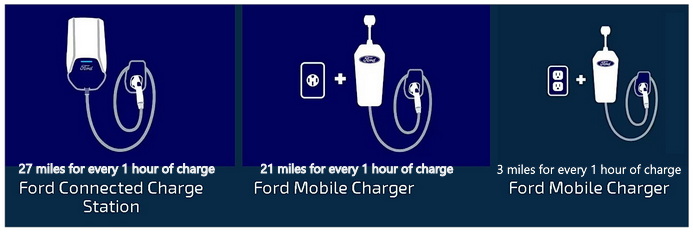Bottom line of this post? EV CARS SUCK!
- “Overnight, we’re looking at 36 miles of range,” he told Insider. “Before I gave it back to Ford, because I wanted to give it back full, I drove it to the office and plugged in at the charger we have there.” — BUSINESS INSIDER
….Standard home outlets generally deliver 120 volts, powering at a level EV experts call “Level 1” charging, while the higher-powered specialty connections that can pump up to 240 volts into electric cars is known as “Level 2.”
The difference is night and day, according to the researchers. Of those who switched from EVs back to gas cars, over 70 percent lacked access to Level 2 charging at home, and slightly less than that lacked Level 2 connections at their workplaces.
“If you don’t have a Level 2, it’s almost impossible [to keep an EV],” noted Kevin Tynan, an automotive analyst for Bloomberg. Tynan used to own a Ford Mustang Mach-E, a battery-electric crossover SUV. Plugging it into his home outlet for an hour could give the Mach-E just three miles of range.
“Overnight, we’re looking at 36 miles of range,” he said. “Before I gave it back to Ford, because I wanted to give it back full, I drove it to the office and plugged it in at the charger we have there.”
For comparison, it takes an average of three minutes to fill up the gas tank of a Ford Mustang, which has enough range to go about 300 miles before needing to refuel.….
1 in 5 EV Buyers Switch Back to Gas-Powered Cars: Study (THE DRIVE | Apr 30, 2021)
Electric vehicles are poised to become a mainstay of transportation in the United States and abroad. Many countries are banning the sale of new internal combustion-powered vehicles around the year 2030, and with nearly every automaker having launched or already launching new EVs, the writing is on the wall.
But according to new research from Nature Energy, not everybody who takes the leap and buys an electric car sticks with the decision. In fact, around one in five people—or 20 percent—switch back to gasoline-powered cars. Why? Well, it’s for a variety of reasons, as it turns out.
The research, to start, was conducted with a sample size of 4,160 people. All of them purchased an electric vehicle in the state of California between 2012 and 2018, so this data is already a few years old now, and as we know, things have changed a lot since 2018 when it comes to EVs. But in any case 1,840 of those 4,160 people had made a decision about purchasing their next vehicle, which is how Nature Energy gathered the data for the “one in five” claim. It gathered other data about these people as well to learn more about their decision.
Those who were least likely to stick with electric vehicles were the ones who depended on them for their only means of transportation—so essentially people who only had one car, and the EV was it. People who lived in places where home charging was difficult also abandoned electric vehicles at higher rates, which is a good segue into the types of people EVs still aren’t right for: those who make less money.
Adopters who were most likely to ditch EVs were generally younger, were more likely to rent their living spaces and were less likely to live in a standalone house. This makes it very difficult to secure 240v fast charging where these people live, so they’re completely dependent on public charging stations. Women also switched back to gas-powered vehicles at higher rates than men, although the paper offered no concrete suggestion as to why that might be.
The study also found that improvements to public charging infrastructure didn’t really matter to these people, implying that they perhaps only travel short distances in their vehicles and take fewer long trips. This suggests that investments in public charging infrastructure may not be the simple one-size-fits-all solution that EVs need to gain popularity…..
One Out Of Five Electric Car Buyers Return To Gas-Powered Cars (POST MILLENNIAL | Sep 5, 2023)
Drivers cited “dissatisfaction with the convenience of charging” as a reason to return to gas-powered vehicles.
A new study has revealed that one in five early adopters of electric vehicles are going back to using internal combustion engines leading to a fall in the price of electric vehicles (EVs).
According to the study published in Nature, of those early adopters of EVs in California from 2012 through 2018, 20 percent of those who opted for plug-in hybrids have returned to gas-powered vehicles, while 18 percent of EV drivers returned to internal combustion engines with their next vehicle purchase.
One demographic is those who moved to a new place with no Level 2 chargers, which could be related to migration away from urban centers to more suburban and rural areas during the Covid pandemic.
Drivers also cited “dissatisfaction with the convenience of charging” as a reason to return to gas-powered vehicles.
Additionally, households with fewer vehicles were more likely to opt for a return to gas-powered vehicles, as well as any household that bought an EV but kept at least one less efficient vehicle.
Women were more likely to return to a gas-powered vehicle than men, according to the study.
In June it was revealed that over one thousand employees of the Ford Motor Company would be losing their jobs as a result of a significant loss of revenue due to electric vehicle investment efforts. Additionally, the automaker is expecting to lose $3 billion in electric vehicle operating profit in 2023, and the company’s current operating costs are $7 billion to $8 billion, higher than any other competitor, which has forced the company to lay off employees, along with other cost-saving measures…..
